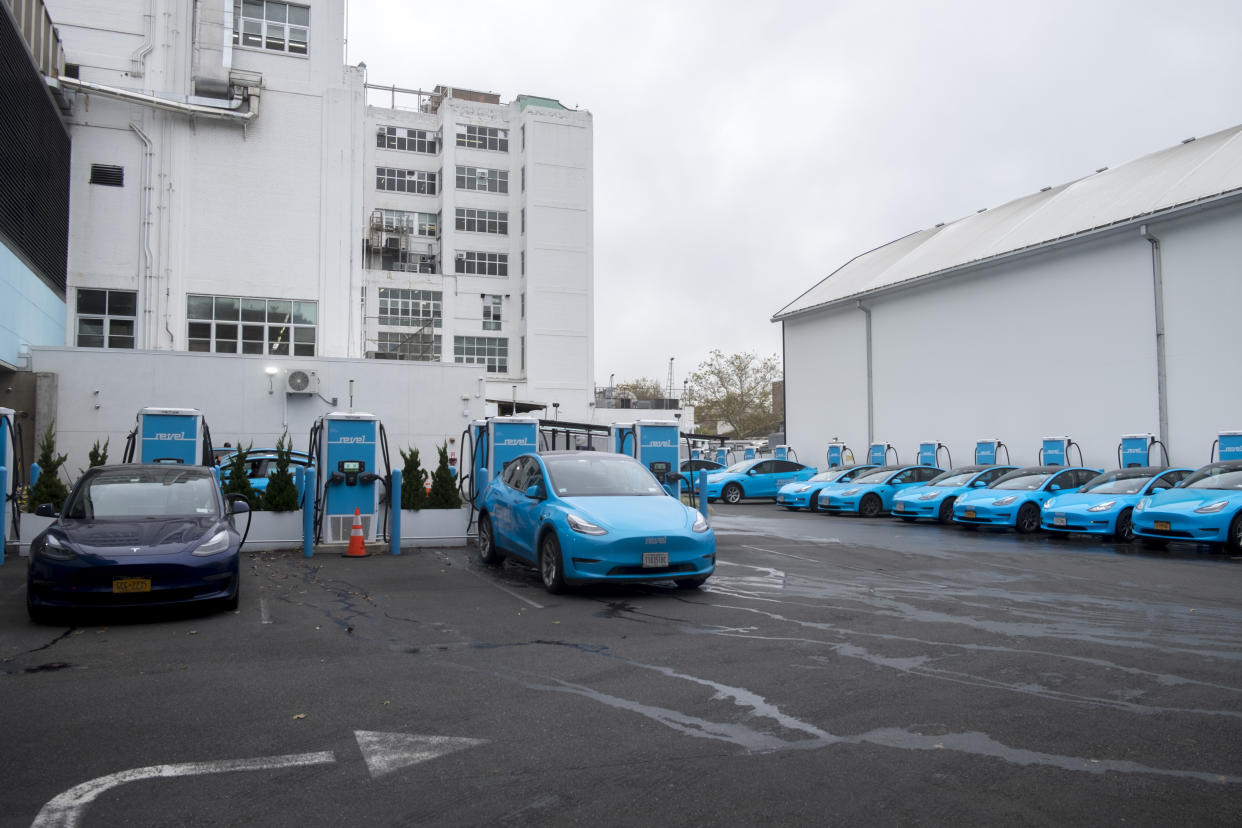As NYC’s fleet of electric Uber, Lyft and Revel cars grows, fears rise charging network won’t meet demand

As New York’s fleet of Uber, Lyft and other for-hire vehicles moves toward a zero-emission mandate by 2030, concerns are growing that the number of car charging stations popping up across the five boroughs won’t be enough to meet driver demand.
The problem may become more acute as the city Taxi and Limousine Commission eliminates its limit on the number of electric vehicles that operate as app-based rideshares.
Of the 78,000 cars currently authorized by TLC as app-based rideshares, roughly 2,200 are electric vehicles, TLC data shows. The TLC expects the fleet to be 25% electrified by the end of 2026. If that happens, roughly 19,500 electric for-hire vehicles will be on the street.
All of them will be hungry for scarce electric chargers, say researchers with the U.S. Department of Energy and the New York State Energy Research and Development Authority. “[T]he existing charging network in New York City is not adequate even in the most optimistic scenario,” researchers with the two agencies said in an April 2022 study.
“[A]lthough charging is demanded in areas nearby high trip demand, fast charging ports are also demanded in areas near driver residences as a supplement for home charging in scenarios with limited overnight charging access,” the study says.
By the time the electric for-hire fleet hits 21,000 cars — a benchmark the TLC hopes to achieve by 2027 — the city will need more than 1,000 direct-current “fast chargers” capable of topping up a car’s battery in 20 minutes to an hour would be required citywide, the study says.
That’s a lot more than the number of fast chargers now available.
The city currently has 187 direct-current fast chargers, distributed among 38 charging stations citywide, according to state government data.
The bulk of the fast chargers are in Brooklyn, which has 68 charging ports at six locations, and Queens, which has 65 ports across 16 locations.
Manhattan has 27 fast-charging ports at 11 stations. On Staten Island, 15 fast-charging ports are distributed across four stations.
The Bronx has just one fast-charging station — a Tesla Supercharger facility at the Bay Plaza Mall, which consists of a dozen charging ports.
Drivers may also use dslower-charging “Level 2” plugs, which require a 240-volt residential or 208-volt commercial outlet. Level 2 charges can bring a car to an 80% charge level overnight or during the course of a workday.
The city currently has 1,960 of the slower-charging Level 2 ports, spread across 634 stations. More than half of those are in Manhattan, where fewer than 10% of Uber and Lyft drivers live.
Electric vehicles also can be charged using alternating current from a normal 120 volt electrical outlet. Fully charging a vehicle with such an outlet — known as “Level 1” charging — can take more than a day.
As things currently stand, only about 15% of the city’s Uber, Lyft and other for-hire cars can be charged overnight, the researchers say.
An overnight charge is adequate for Brooklyn-based Uber driver Lazizjon Negmatullaev. “On a typical day, [I] can drive the whole day without worrying about charging,” Negmatullaev told the Daily News.
Negmatullaev, who made the shift to an electric vehicle last month with a new TLC plate, said he’s able to drive without worry because he charges his Tesla Model Y between shifts — overnight at a parking spot he owns near his apartment.
But most drivers — who park their cars on city streets overnight — lack Negmatullaev’s easy access to even a slow charger.
“The problem is drivers tend to live where there isn’t overnight charging,” said Bruce Schaller, a traffic and transit consultant and former deputy commissioner at the city’s Department of Transportation.
“In most of the country, people have a garage and a driveway — obviously not in New York.”
Schaller proposed expanding the city’s network of slower Level 2 chargers to spaces like retail parking lots, where drivers can reliably find overnight parking.
“The thing about the outer boroughs is there is a lot [potential] overnight parking at grocery stores and that sort of thing,” he said. “To me, that’s kind of the model.”
Revel, the company first known for its outgoing fleet of rental e-mopeds, has been operating for-hire electric cars since 2021.
The firm also operates three large fast-charging hubs in the five boroughs. Revel’s Long Island City charging station — which includes 14 fast chargers — opened earlier this month.
“Finding an available site that can support this kind of infrastructure is tough,” Haley Rubinson, Revel’s vice president of corporate affairs, told The News. “It’s not just like, any open lot, we take out a lease and there you go. There’s a limited amount of real estate with available power or the ability to easily bring power over.”
“That doesn’t make building on sites impossible, but it makes it difficult and time consuming,” she said.
Revel officials say they plan to open 300 more DC fast chargers in New York before 2025.
Meanwhile, the fast chargers at some popular destinations are already getting crowded.
At Kennedy Airport, “you can be waiting an hour or two [for a plug],” Negmatullaev said, referring to the dozen fast-charge Tesla plugs near the airport, a major destination for Uber, Lyft and taxi drivers.
“You can wait two to three hours just to charge your car and be on your way.”

